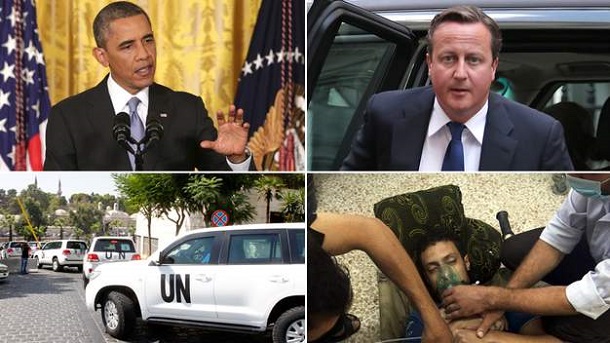UK PM David Cameron will hold war talks at Downing Street today as military commanders draw up plans for missile strikes against Syria.
Mr Cameron will chair a meeting of the National Security Council (NSC) after insisting the West must not “stand idly by” in the wake of Syria’s suspected chemical attack.
In talks by telephone last night with US President Barack Obama, the two leaders agreed that “all the information available confirmed a chemical weapons attack had taken place”, said a Downing Street spokesperson.
“They both agreed they were in no doubt that the Assad regime was responsible,” added the spokesperson.
United Nations weapons inspectors arrived at the site of the alleged attacks on Wednesday morning, a day after suspending their mission over safety concerns.
The inspectors came under sniper fire when they began their operation on Monday.
Foreign Secretary William Hague has ramped up the pressure to act on “barbarous” Syria by setting out the case for action in a national newspaper comment piece.
He maintained that “global security” was at stake and that the world “cannot allow the use of chemical weapons in the 21st century to go unchallenged”.
The NSC meeting is expected to discuss the intelligence gathered by United Nations inspectors from their visit to Mouadamiya, the site of last week’s suspected chemical weapons attack that allegedly killed more than 1,300.
General Sir Nick Houghton, chief of the defence staff, is also expected to outline a series of options for targeted attacks against Syria at the meeting .
He will tell ministers the UK could assist US forces with cruise missile strikes launched from submarines, warships and aircraft against targets such as command and control bunkers.
Tomorrow, Parliament will be recalled for a final vote on what action should be taken.
According to sources say a government motion is expected to call for “appropriate measures” but will not contain a timetable for action.
Speaking yesterday, Mr Cameron said action must be “proportionate, have to be legal, would have to specifically be about deterring the use of chemical weapons”.
It is understood the most likely military response would be a one-off or limited guided missile strikes on Syrian military targets fired from US Navy warships.
The US Navy is repositioning several vessels, including four cruise missile-carrying destroyers in the eastern Mediterranean, as well as a missile-firing submarine.
Military experts suggested a British Trafalgar class submarine might also be a potential launch platform.
Russia has started to pull its citizens out of Syria as the likelihood of military action increases.
It flew 89 out of the country on Tuesday night and 28 more on Wednesday morning. The country is strongly against military action.
Mr Cameron said any intervention in Syria would not be about the conflict itself, but preventing the use of chemical weapons by any regime.
Decisions about British involvement have not been taken, he said yesterday, adding Parliament was the “right place to set out all of the arguments”.
“Obviously this is a developing situation, as I say, decisions have not been taken, but we shouldn’t stand by when we see this massive use of chemical weapons and appalling levels of suffering,” he said.
“But I would say this to people – there is never 100% certainty, there is never one piece or several pieces of intelligence that give you absolute certainty.
“But what we know is this regime has huge stocks of chemical weapons. We know they have used them on at least 10 occasions prior to this last widescale use.
“We know they have both the motive and the opportunity whereas the opposition does not have those things and the opposition’s chance of having used chemical weapons in our view is vanishingly small.”
The NSC includes Defence Secretary Philip Hammond, Home Secretary Theresa May and Deputy Prime Minister Nick Clegg among its members.
Labour leader Ed Miliband yesterday indicated that his party would consider supporting international action.
But he added that support was “only on the basis that it was legal, that it was specifically limited to deterring the future use of chemical weapons, and that any actions contemplated had clear and achievable goals.”
And Deputy Prime Minister Nick Clegg said Britain would “set a very dangerous precedent indeed” if it stood back and failed to act.
While political momentum towards intervention mounts, the British public has yet to be persuaded.
A YouGov survey for The Sun revealed that nearly three-quarters of people oppose the deployment of British troops to Syria.
And a majority of 3-1 believe the Government should be bound by Parliament’s vote tomorrow.
The Archbishop of Canterbury has warned MPs not to rush in their decision on whether to vote for miltary intervention in the Syria conflict.
The Most Rev Justin Welby said he feared the possible consequences of intervention saying they were “beyond description and horrible”.
[adrotate banner=”67″]


